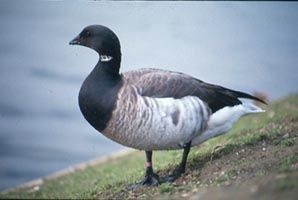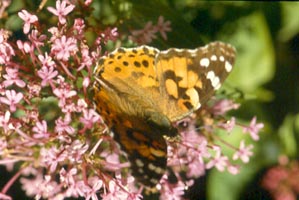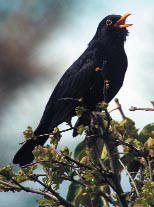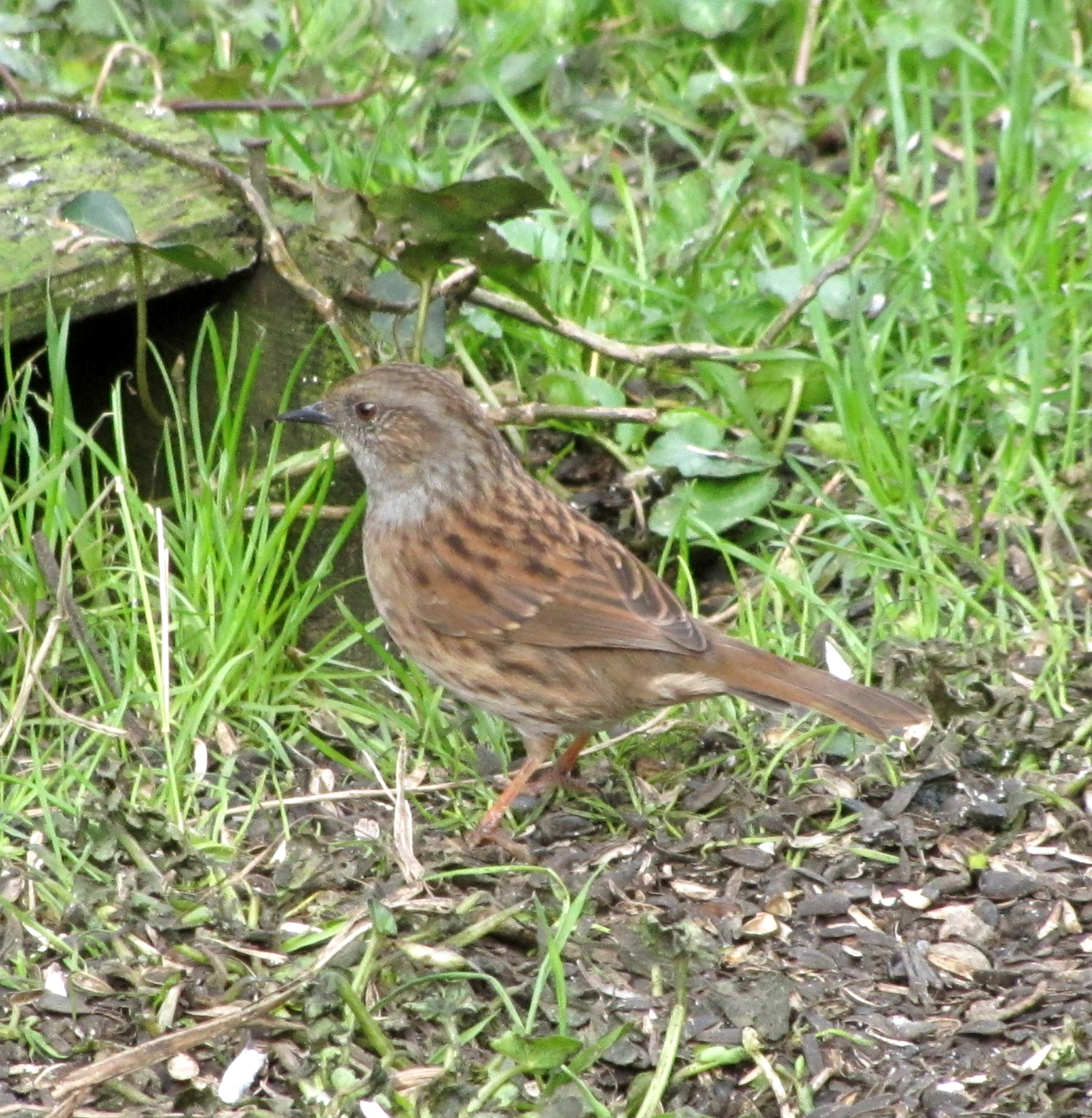ALARMING
BLACKBIRDS:
Whenever
the BirdWatch Ireland South Dublin branch have a talk about birdsong
or a guide outing to listen to birdsong we tell people that two birds
that can sound similar are the Blackbird and the Song Thrush. We tell
them that the Song Thrush often ends a snatch of song by repeating single
notes, usually four times but the Blackbird never repeats single notes
having a flowing mellower song, which might repeat a complete song cycle,
but not single notes. Well, as often happens there’s always a
bird out there waiting to disprove your confident declaration. A Blackbird
singing from a neighbour’s garden not only incorporates four repeated
notes, which it probably copied from a Song Thrush, but it also mimics
another, less melodic sound. When I heard it singing first in February
I realized parts of its song sounded very like a neighbour’s very
distinctive house alarm, one that goes off frequently. The Blackbird
was doing a very good imitation of the oscillating sound of the alarm.
Starlings are known as great mimics of other birds but Blackbirds aren’t
so I thought I’d check the Internet. First story the search engine
came up with concerned a Blackbird in England which became notorious
last year for imitating, not only alarms, but it also did a very convincing
and loud imitation of a ambulance siren as well as incorporating the
ring tone of the mobile phone of the chap whose garden he was singing
in. The family lived near a hospital with ambulances passing regularly
but they weren’t that thrilled to hear the call of one at 5.00am
every morning.
This
particular bird can be seen and heard on You Tube at www.youtube.com/watch?v=KifpQe02HEE
Another
search result was a bird forum where someone described a Blackbird who
had incorporated the sound of a horse whinnying. She said it usually
sang this particular phrase while in flight, giving the impression of
a flying horse passing overhead. Our Blackbirds will usually have stopped
singing by early June but if you want to hear bird songs and how to
identify individual species you can come along to our Dawn Chorus meeting
at the car park at Cabinteely House at 4.00am on Sunday17th May. For
those who don’t fancy a early start we also have a evening chorus
outing at BirdWatch’s new reserve at Blackditch in Co. Wicklow
at 7.30pm on Saturday 9th May meeting at the Newcastle Inn in Newcastle.
Everybody welcome, you don’t have to be a BirdWatch member.
A bird doesn’t sing because it has an answer, it
sings because it has a song. – Maya Angelou
The Dalkey Starlings in winter often recreate the high-pitched call
of Swifts, while the Swifts themselves would be flying around in the
hot air of Africa. They spend a very short time here since they depend
solely on air borne insects that are only flying when the air is at
its warmest. The first individual Swifts are usually seen in early May
and they only stay till early August so they are real birds of high
summer. They are one of the last migrants to arrive almost two months
after our earliest migrants. Wheatears and Sandwich Terns were seen
in early March. Five Sand Martins were flying in over Dalkey Quarry
on St. Patrick’s Day and a Swallow was seen flying in off the
sea under Killiney Hill on 20th March. Chiffchaffs, small yellowish
green warblers were seen and heard the same weekend and there’s
quite a few singing on Dalkey and Killiney hills at the moment.
We hadn’t seen Jays for a few months, either
in the garden where they had become regular, very welcome visitors,
or around the two hills where their presence was often made known by
their shrieking call, or a brief flash of white or blue as they moved
secretly through the trees. I’d given up on them attempting to
nest in the woods around Killiney Hill this year. They had attempted
to nest last year and were witnessed carrying nest building material,
but I don’t think they succeeded. Anyhow early April found us
walking through Dalkey quarry when that distinctive white rump patch
flashed up across the cliffs above us. A most unlikely place to find
a bird usually associated with oak woods but this bird evidently hadn’t
read the reference book as it flitted around the rock face, its pinkish
brown plumage blending in against the golden brown of the rock face.
Saw it later when it had moved up to the woods and since they don’t
build nests too early, who knows, there might be some young ones around
yet. I mentioned before someone who had done a thesis on Jays during
which he would bait traps with acorns then catch weigh and ring the
captured Jay before releasing it again. He kept getting the same Jay
in the trap and since they’re very intelligent birds it evidently
knew it would be released and it was worth the inconvenience for the
sake of an easy meal.
If the weather is like previous summers it’ll
seem like grim advice but if there is a dry warm spell birdbaths are
very valuable to birds both for drinking but also for washing to keep
their flight feathers clean and in good working condition. If you don’t
have a birdbath an upturned dustbin lid or plate will do, just make
sure they’re not somewhere where cats can sneak up on the bathing
birds and make sure they’re slightly tilted so the birds can wade
in from the shallow end. Blackbirds can often be seen taking dustbaths
on warm sunny days, snuggling down into the soil and basking with their
heads raised. Some birds do this to aggravate ants which then spray
them with formic acid which doesn’t harm the birds but does kill
any mites they might have in their feathers. If you’ve been feeding
birds during the summer don’t stop now. Although you won’t
be getting as many birds you can still be helping the ones you do get
since when you provide a ready source of food for them it gives them
more time to hunt for the insects they need to feed their young.
TIPS TO RECOGNISING SOME COMMON BIRD SONGS:
Song Thrush: Very strident, intense but
melodic. Repeats phrases a number of times in each song bout. Some phrases
said to sound like ‘Cherry Dew’ and ‘Knee Deep’.
Ends song by repeating single note usually four times. Often begins
singing in November. Often last bird singing on warm summer nights.
Blackbird: Very mellow, melodic rounded
notes with fewer intervals between phrases then Song Thrush. Rarely
repeats song or notes. Starts singing February/March ends late May or
early June.
Mistle Thrush: Wild, haunting, distant
quality. Succession of similar short phrases which are richer and longer
than those of Song Thrush with no repetition of single notes. Always
sings from very high perch. Often singing on windy days which give it
its alternative name of Storm Cock.
Robin: Clear, shrill, whistly phrases delivered
in very relaxed fashion. Each phrase different with long gaps in between.
Slow notes tumble into rapid ones. Sings all year though song changes
slightly in breeding season.
Wren: Very loud, considering his size.
A sudden explosion of ‘alarmed’ song, which ends abruptly
with trilling phrase as opposed to Robins single notes. Sings from cover
or low in bush, brambles.
Great Tit: Loud metallic double note, sounds
like ‘Tee-Cher’ though many variations on song from individual
birds.
Blackcap: Loud explosive jumble of flutelike
and scratchy notes with phrases getting louder before ending abruptly.
Very melodic, often described as Ireland’s nearest equivalent
to a Nightingale, & phrases in song, similar to Blackbird and Robin’s.
Usually sings from dense cover of brambles bushes, holly, etc.
Dunnock: Brief, fast high-pitched and quite sweet. Said to sound
like unoiled wheels of a trolley. Often confused with Wren but quieter
and lacks trills.
Greenfinch: Chirpy chattering song often
described as like a machine gun delivered from high branch or tree top.
Ends with a rasping ‘Raspberry’ note.
Chaffinch: Bubbly, loud gradually descending
song ending with a note that can sound like a wolf-whistle. Lots of
different call notes which can sound like ‘Ping’ or ‘Pink’.
Very incessant in oak woods.
Willow
Warbler: Similarly descending song as Chaffinch but much wispier.
Almost identical to Chiffchaff in appearance the easiest way to differentiate
them is by their song.
Chiefchaff: Named after his song, a repetitive
wispy ‘Chiff-Chaff ‘Often heard in woodland.
|






